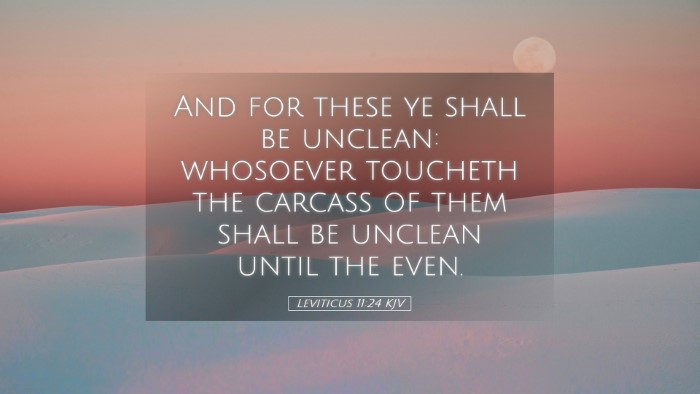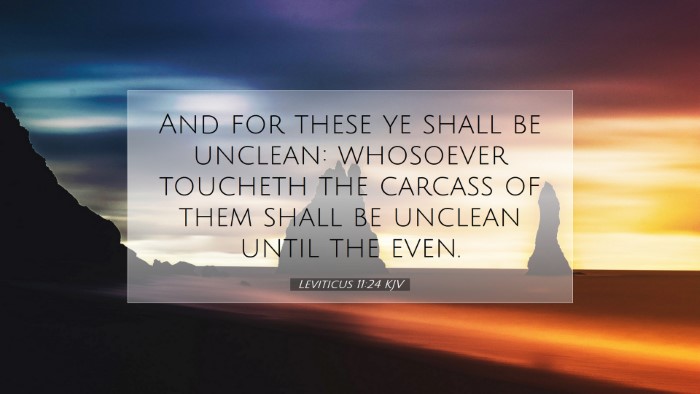Commentary on Leviticus 11:24
Verse Reference: Leviticus 11:24 - "And by these you shall become unclean. Whoever touches their carcass shall be unclean until the evening."
Introduction
This verse is part of the Holiness Code outlined in the book of Leviticus, a critical text that provides instructions for ritual purity and the dietary laws given to the Israelites. The laws regarding clean and unclean animals serve not only a practical purpose but also reflect God's desire for His people to maintain holiness.
Contextual Background
Leviticus 11 outlines various classifications of animals that are clean and unclean. These classifications embody God's overarching theme of holiness and separation. The Israelites, as God’s chosen people, were expected to hold fast to purity in all aspects of life, which included dietary restrictions. This particular verse emphasizes the consequences of coming into contact with unclean animals, illustrating the serious nature of ritual purity.
Theological Implications
Holiness and Separation
Henry notes that these laws remind the Israelites of their distinct identity as God's chosen people. The act of touching an unclean animal’s carcass led to ceremonial uncleanness, affecting one's participation in worship and community activities. This reflects God's holiness and His desire for His people to embody that same purity.
The Nature of Ritual Purity
Barnes emphasizes that the concept of uncleanness was not sinful in itself but rather a state that required ritual cleansing. The physical act of touching an unclean creature’s carcass represents deeper spiritual truths about sin and purity. It symbolizes how easily one can become contaminated by the surrounding environment.
Practical Considerations
Clarke suggests that an understanding of cleanliness in biblical terms informs how believers today might perceive holiness. The dietary laws serve as metaphorical reminders of the need for spiritual vigilance. Just as touching an unclean animal resulted in physical impurity, so too does engaging with sinful practices lead a person away from God's holiness.
Cultural Relevance
Henry points out that these laws were not merely religious regulations but also served practical purposes in an ancient agrarian society, ensuring health and safety among the people. The implications of dietary restrictions still resonate today as discussions about nutrition, health, and body sanctity continue to emerge in contemporary religious discourse.
Lessons for Ministry
Pastors and leaders can draw several insights from this verse:
- Promote Awareness: Encourage congregations to recognize the importance of their spiritual hygiene—what they expose themselves to impacts their relationship with God.
- Contextual Teaching: Teach the Old Testament laws in a way that highlights their relevance to modern life, pointing to the need for holiness in an unclean world.
- Community Standards: Foster an environment where accountability and righteousness are encouraged, mirroring the communal aspect of purity in ancient Israel.
Conclusion
Leviticus 11:24 invites deep reflection on the nature of holiness and the impact of ritual uncleanness. By understanding and applying the principles contained within this verse, believers can strive for a lifestyle that honors God and acknowledges the sensitivity required in their spiritual walks. The insights derived from the rich tradition of biblical commentary affirm that holiness is not merely an ancient concept but a lifelong pursuit for all who seek to be in covenant with God.


